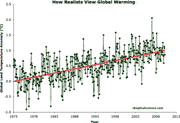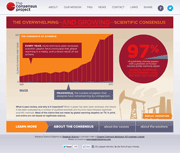 Arguments
Arguments
 Software
Software
 Resources
Comments
Resources
Comments
 The Consensus Project
The Consensus Project
 Translations
Translations
 About
Support
About
Support


Latest Posts
- SkS Weekly Climate Change & Global Warming News Roundup #04
- Skeptical Science New Research for Week #4 2025
- Climate Adam: Will 2025 be the Hottest Year Ever Recorded?
- Sabin 33 #12 - Do solar panels work in cold or cloudy climates?
- Moving away from high-end emissions scenarios
- 2025 SkS Weekly Climate Change & Global Warming News Roundup #03
- Fact brief - Can CO2 be ignored because it’s just a trace gas?
- Skeptical Science New Research for Week #3 2025
- Nobody’s insurance rates are safe from climate change
- Sabin 33 #11 - Is solar energy more expensive than energy from fossil fuels?
- The role of climate change in the catastrophic 2025 Los Angeles fires
- 2025 SkS Weekly Climate Change & Global Warming News Roundup #02
- Skeptical Science New Research for Week #2 2025
- Exploring the drivers of modern global warming
- Sabin 33 #10 - Will utility-scale solar farms destroy the value of nearby homes?
- Climate news to watch in 2025
- 2025 SkS Weekly Climate Change & Global Warming News Roundup #01
- Skeptical Science New Research for Week #1 2025
- The forgotten story of Jimmy Carter’s White House solar panels
- Sabin 33 #9 - Will reliance on solar make the United States dependent on China and other countries?
- 2024 in review - a bittersweet year for our team
- 2024 SkS Weekly Climate Change & Global Warming News Roundup #52
- Skeptical Science New Research for Week #52 2024
- Climate Adam: 2024 Through the Eyes of a Climate Scientist
- Sabin 33 #8 - Will solar development destroy jobs?
- Uruguay, pioneer in renewable energy: a model for the world?
- 2024 SkS Weekly Climate Change & Global Warming News Roundup #51
- Fact brief - Are we heading into an 'ice age'?
- Skeptical Science New Research for Week #51 2024
- Stop emissions, stop warming: A climate reality check
Escalator 2022

This version of the Escalator graphic is based on data including the year 2022. The previous versions are still available here with data including 2015 or as a video including 2016. When Robert Rohde updated the escalator and produced a staircase of denial in January 2023, it motivated us to follow suit and to update our escalator with the latest available data as well.
One of the most common misunderstandings amongst climate contrarians is the difference between short-term noise and long-term signal. This animation shows how the same temperature data (black) that is used to determine the long-term global surface air warming trend of 0.19°C per decade (red) can be used inappropriately to "cherrypick" short time periods that show a cooling trend simply because the endpoints are carefully chosen and the trend is dominated by short-term noise in the data (blue steps). Isn't it strange how six periods of cooling can add up to a clear warming trend over the last 4 decades? Several factors can have a large impact on short-term temperatures, such as oceanic cycles like the El Niño Southern Oscillation (ENSO) or the 11-year solar cycle. These short-term cycles don't have long-term effects on the Earth's temperature, unlike the continuing upward trend caused by global warming from human greenhouse gas emissions.
Source for data used in the graphic: Global mean monthly temperature anomalies, relative to the 1850-1900 mean, from Berkeley Earth.
Blog post introducing the 2022 version of the escalator graphic
Other versions
Printable Version | Back to Graphics by Skeptical Science
|
|
Skeptical Science Graphics by Skeptical Science is licensed under a Creative Commons Attribution 4.0 International License. |
THE ESCALATOR

(free to republish)
























































